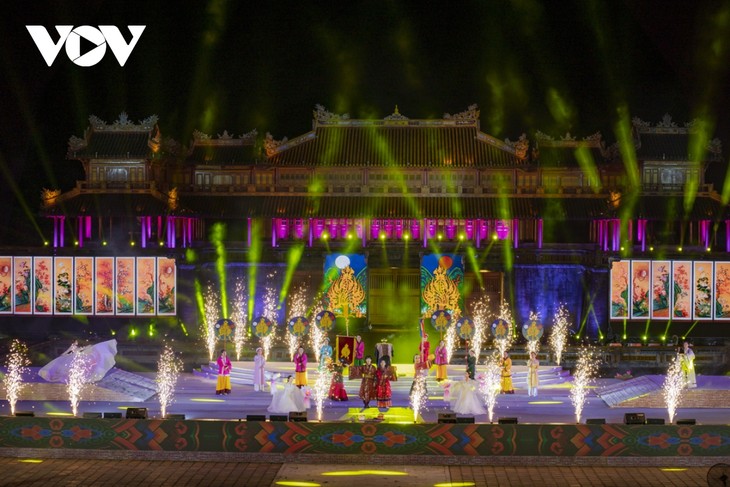(VOVWORLD) - Vietnam boasts a wealth of cultural diversity thanks to its numerous ethnic groups. As each group possesses a distinct cultural identity, they collectively form a rich and varied cultural heritage. Safeguarding and promoting this cultural heritage fulfils the cultural aspirations of the people while building an integrated Vietnamese culture imbued with national identity. It also generates resources for the overall development of Vietnam.
 An art program at the Hue Imperial City Relic Site (photo: VOV) An art program at the Hue Imperial City Relic Site (photo: VOV) |
Vietnam has 54 ethnic groups, each with its own language, customs, and traditions. Despite their differences, they come together to confront natural disasters and external threats, working collectively to develop and safeguard the nation. These diverse subcultures evolve side by side and harmonize to foster unity within the rich tapestry of Vietnamese culture.
A rich cultural heritage
According to the Department of Cultural Heritage, Vietnam’s 40,000 historical and cultural relics and scenic spots include 10,000 provincial and municipal level relics, 3,600 national relics, and 130 special national relics. Vietnam has some 8,000 festivals that celebrate local customs, practices, performing arts, crafts, cuisine, and costumes.
From a handful of museums constructed at the end of the 19th century, Vietnam has developed a modern museum system that includes 180 institutions that collectively house more than 4 million artifacts, relics, and antiques reflecting local, regional, or national culture.
Vietnam has had 33 world heritages acknowledged by UNESCO over the past 30 years, 30 of them designated as cultural heritages. These cultural treasures are a priceless legacy left by our ancestors that attests to the enduring nature of Vietnamese culture. These heritages show to the world the visual, spiritual, and historical depth and significance of Vietnamese culture past and present.
Cultural heritage promoted
Throughout national construction and development, Vietnam has consistently recognized and valued cultural heritage as the embodiment of national identity and a valuable resource for national development. Decree 65, the inaugural decree on cultural heritage preservation signed by President Ho Chi Minh on November 23, 1945, states "Preserving cultural heritage is of paramount importance and necessity in Vietnam’s national development."
Subsequently, a multitude of legal instruments on the preservation of cultural heritage have been adopted, progressively attaining a more cohesive, inclusive, and detailed legal framework. These include the 2001 Law on Cultural Heritage, the Law amending and supplementing the 2009 Law on Cultural Heritage, and other legislative provisions to safeguard and promote the cultural heritage of Vietnam.
To adapt to societal changes, and to establish a legal framework for the preservation and promotion of cultural heritage, the Ministry of Culture, Sports, and Tourism is collecting public input on the revised draft Law on Cultural Heritage.
For this initiative, the Ministry is concentrating on three key policy areas, one of which is the mobilization of resources to safeguard and promote Vietnam’s cultural heritage.
The draft law clarifies regulations protecting and promoting cultural heritage, introduces new provisions for the "Cultural Heritage Preservation Fund," and proposes amendments to clarify the roles and responsibilities of social organizations in these endeavors. It also outlines a direction for, and adjustments to, community management and protection of intangible cultural heritages, emphasizing sustainable development and integration.
The revised Law on Cultural Heritage is slated for presentation to the next National Assembly session in 2024.
Safeguarding and enhancing cultural heritages is the collective responsibility of the people, who have a pivotal role in the protection, preservation, transmission, and promotion of cultural heritage. Communities who live in proximity to these heritages have a heightened awareness of their significance, which fosters pride and instills a sense of responsibility for their protection. The preservation of cultural heritages gives a distinctive character to tourism in each locale, which helps the economic development of Vietnam’s provinces and cities.
Culture creates a nation’s identity and is the essence of its soul. As long as the culture thrives, the nation endures.